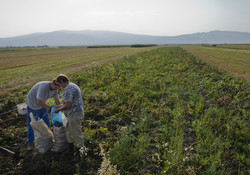Conference on health and climate sets European priorities

WHO/Malin Bring
WHO European Member States have identified priorities to maintain and accelerate momentum in building health systems' capacity and creating climate-resilient societies:
- to strengthen resilience to climate-related health hazards and natural disasters;
- to build adaptive capacity, both human and institutional;
- to strengthen the evidence for integrating health measures and assessing climate risks in national policy-making; and
- to measure, reduce and manage the greenhouse-gas emissions of health systems.
They were presented by Professor Patrick Rampal, the new co-chair of the WHO Working Group on Health in Climate Change, at the Second Global Conference on Health and Climate, held in Paris on 7–8 July 2016. To achieve these priorities, Member States call for stronger communication and cross-sectoral action, as well as partnerships and collaboration with WHO and other international partners.
Facilitating health access to climate finance
Dr Piroska Östlin, Director of the Division of Policy and Governance for Health and Well-being at WHO/Europe, spoke at a Conference session on facilitating health access to climate finance, chaired by the World Bank and attended by health ministers and senior officials of international organizations and development banks. She stressed that the lack of funding specifically for adaptation impedes the development and adoption of policies to increase resilience and take adaptation measures to protect health in several European countries, even though they have a relatively strong capacity to plan and implement such measures. This problem is compounded by several countries' ineligibility to receive development assistance owing to their middle-income status.
The economic dimension to mitigation and its co-benefits for health through improved air quality needed to be estimated and evaluated, as WHO/Europe was doing. Dr Östlin echoed the request of the European Working Group on Health in Climate Change for Member States to strengthen international collaboration, and explore opportunities for enhanced cooperation through, for example, the Climate and Clean and Air Coalition.
Breathe Life campaign
WHO and the Climate and Clean Air Coalition launched the global Breathe Life campaign during the Conference. It aims to raise awareness about the health risks of short-lived climate pollutants such as black carbon, ozone and methane, which contribute significantly to climate change and air pollution.
About the Second Global Conference
The Second Global Conference on Health and Climate took place in Paris, France. Hosted by the Government of France, holder of the Presidency of the 21st session of the Conference of the Parties (COP21) to the United Nations Framework Convention on Climate Change, the Conference was held to define an action agenda to implement the Paris Agreement on climate change. Its key outcome was an action agenda that will contribute to 22nd session of the Conference of the Parties (COP22), to be held in November 2016 in Marrakesh, under the Presidency of the Government of Morocco.
The Conference brought together more than 300 government ministers, health experts and practitioners, nongovernmental organizations and experts in climate change and sustainable development. They highlighted the importance of the health sector's providing strong leadership in communicating to policy-makers and the public about:
- the urgent nature of climate change;
- its severe and growing health risks;
- gains that can result from addressing climate risks; and
- links to related issues, for example, climate change and air pollution.



